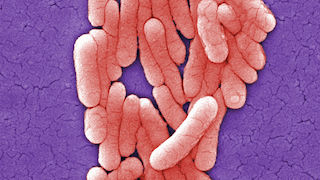Changjiang Dong
See the following -
How We Could Kill Superbugs Without Antibiotics
 Antibiotics will soon be useless, but U.K. scientists have come up with a new way to kill bacteria—and it's not with a drug. And perhaps the best thing about this approach is that bacteria may not be able to build resistance against it. A team from the University of East Anglia, publishing in the journal Nature, figured out that the key to destroying bacteria is understanding how they build their defensive walls. It’s like ruining an astronaut’s space suit instead of going after the astronauts inside...
Antibiotics will soon be useless, but U.K. scientists have come up with a new way to kill bacteria—and it's not with a drug. And perhaps the best thing about this approach is that bacteria may not be able to build resistance against it. A team from the University of East Anglia, publishing in the journal Nature, figured out that the key to destroying bacteria is understanding how they build their defensive walls. It’s like ruining an astronaut’s space suit instead of going after the astronauts inside...
- Login to post comments
Scientists Have Figured Out Why Drug-Resistant 'Superbugs' Are So Hard to Kill
You may have already heard about the growing problem caused by antibiotic resistance - the spread of superbugs that have evolved to become resistant to the antibiotics we usually attack them with. It's an issue that could have very serious implications for global health and disease if it isn't tackled urgently, and now researchers have made an important step in finding a solution. A new study has discovered how these drug-resistant bacterial cells maintain a defensive barrier, and if further research can find a way to bring down these walls - rather than targeting the bacteria directly - the bacteria could be prevented from developing drug resistance in the first place...
- Login to post comments
UEA Scientists Pave Way for New Generation of Superbug Drugs
 New research published today in the journal Nature reveals the mechanism by which drug-resistant bacterial cells maintain a defensive barrier. The findings pave the way for a new wave of drugs that kill superbugs by bringing down their defensive walls rather than attacking the bacteria itself. It means that in future, bacteria may not develop drug-resistance at all. Unravelling this mechanism could also help scientists understand more about human cell dysfunctions linked to disorders such as diabetes, Parkinson’s and other neurodegenerative diseases...
New research published today in the journal Nature reveals the mechanism by which drug-resistant bacterial cells maintain a defensive barrier. The findings pave the way for a new wave of drugs that kill superbugs by bringing down their defensive walls rather than attacking the bacteria itself. It means that in future, bacteria may not develop drug-resistance at all. Unravelling this mechanism could also help scientists understand more about human cell dysfunctions linked to disorders such as diabetes, Parkinson’s and other neurodegenerative diseases...
- Login to post comments